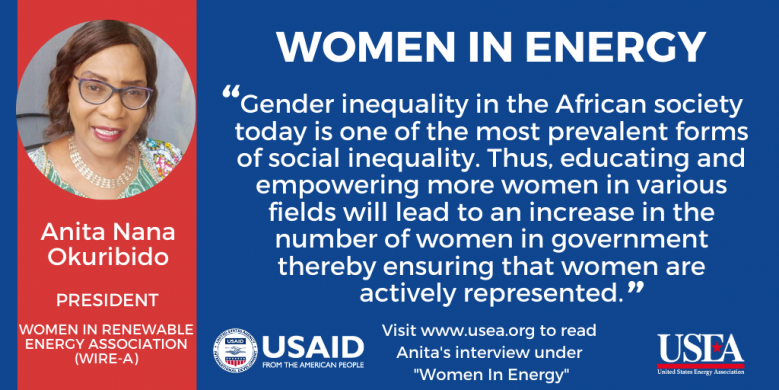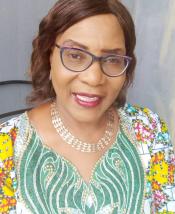
Women In Energy: Anita Nana Okuribido
The Women in Energy series is a joint project between USEA and USAID that was developed out of USEA’s Engendering Utilities Partnership, a program funded by USAID to improve gender policies and gender outcomes at their respective organizations.

Every month we feature a woman who has shown exemplary leadership. We want to showcase your story this month. The women among you come from diverse backgrounds and roles, and they bring with them a unique perspective to gender equality within the energy sector.

Known for her passion and zeal towards promoting Renewable Energy and Green Alternatives, Chief Mrs. Anita Nana Okuribido, affectionately referred to as ‘Mama Renewable’, has contributed immensely to the positive growth and utilization of Renewable Energy in Nigeria.
A strategic planner, implementer, solutions provider, ideas developer and change agent, she is quite active at the bottom of the pyramid with extensive interests in Agricultural development, Renewable Energy Development and Sustainable Applications for Natural/Green Economic growth. A robust and dynamic speaker, she is highly sought after for her practical experience and extensive support/mentorship and consultancy for Clean Energy initiatives, start-ups and has spoken at multiple Renewable Energy fora; International, Regional and Local.
Chief (Mrs) Okuribido is the National President of the Council for Renewable Energy Nigeria (CREN), a non-profit oriented member based association that serves as the Umbrella body for all operators, stakeholders and interests in the Renewable Energy Industry in Nigeria. She is the National President of Women in Renewable Energy Association (WIRE-A). She is also a board member of the Solar Energy Program of the BANK OF Industry/United Nations Development Program since 2015 (SEP has commissioned over 40 off-grid Solar Power plants for Rural Communities without access to Power). She is the Vice President, South-West of Nigerian Women Group (NAWORG) of the National Association of Chambers of Commerce, Industry, Mines and Agriculture, NACCIMA; South-West Coordinator, Centre for International Private Enterprise, CIPE-ANWBN; Member, Solar Energy Society of Nigeria.
As an entrepreneur, she is the CEO of Siman Engineering Ltd, a Renewable Energy Company that focuses on Technology Development, that develops and implements Clean and Green Energy solutions focusing on Rural Empowerment, Establishment of Community Based Organizations (CBOs), SME’s Development, Corporate and CSR Initiatives.
While her avowed passion is to midwife the large scale development of Renewable Energy in Nigeria, developing women and youths while creating opportunities and growing entrepreneurs; she is quite particular on generation, deployment and utilization of bio-energy for Sustainable Energy and Enhanced Agricultural Development.
Chief (Mrs) Okuribido is the Founder of the Green Energy Institute, Nigeria, a new Initiative at and in collaboration with NACCIMA Women Business Group, Women in Renewable Energy Nigeria, Council for Renewable Energy Nigeria and endorsed by the Ministry of Power, Works, Housing and other MDAs. The Green Energy Institute has been conceptualized to act as a Developmental Institution to enhance and upgrade skills acquisition, technical knowhow and deployment of Green Energy Devices and Components.
*USEA does not alter the substance of the responses from the women featured. The answers are their own.
Women in Energy Interview Questions
How have your education and career path led you to where you are now?
“Having attended Obafemi Awolowo University, Ile-Ife, Oyo State, Nigeria and obtaining a Bachelor of Science in Agricultural Economics with the following experiences:
•The Distribution of Short Run Price Movement of Selected Agricultural Products
•Feasibility report on the Expansion and Reactivation of Mokwa Ranch and Abattoir Complex in Niger State, using Renewable Energy Technologies.
Competencies Developed
•Data Collection
•Computer Programming
•Research Design
•Content Analysis
•Project Coordination
•Project Development, Innovation and research.
I have become an innovative and strategic planner. An implementer, solutions provider, ideas developer and change agent. I have been active at the bottom of the pyramid with extensive interests in Agricultural development, Renewable Energy Development and Sustainable Applications for Natural/Green Economic growth. A robust and dynamic speaker, I am highly sought after for my practical experience and extensive support/mentorship and consultancy for Clean Energy initiatives, start-ups and have spoken at multiple Renewable Energy fora [International, Regional and Local].”
Over the course of your career, have you witnessed changes in the sector that have launched more women into leadership positions?
“Absolutely, yes. I commenced in the Green growth career in 1981 after my youth corps service and I happened to have been the lone voice; as a woman, working with men and women alike, in this value chain. This continued for so many years until 2004 when I had a breakthrough to develop boreholes and install solar water system for irrigation purpose in 50 communities of Benue state, Nigeria. I had to employ and train my staff to work on this huge project as it entailed working in various communities. Hence, I started the establishment of a community-based organization to identify their needs and proffer solutions according to their occupational clusters. I had to work with women leaders, some who became interested in renewable energy. So began the journey to groom and launch women in this Green field which has recorded enormous success over the years. Among these successes are:
#Onenigerianchildonesolarlamp
#Oneruralcommunityonesolarkiosk”
Technology is transforming the traditional utility business model into a more modern interactive grid. Some utilities view this transformation as an opportunity to focus on change management and diversity. Research provides compelling evidence that inclusion and diversity unlock innovation and drives better business performance. What, if anything, is your organization doing to attract, retain, and promote more women into senior management positions to respond to the dramatic industry transformation?
“As the Chairman, Women in Sustainable Power African Network (WISPA-Net) I have worked assiduously in the advocacy quest for Gender Equality and Inclusion in the Energy, Oil & Gas Sector. This association made up of African Energy Women Experts with roles cut across the entire energy value chain has the following aims & expectations:
a. To project diversity in leadership which will in turn deliver real benefits such as introducing variety of new perspectives and experiences to the women leadership team. Such fresh input can help companies thrive by boosting innovation and revenue, attracting and retaining talent and appealing to inclusion-focused customers.
b. To work with stakeholders in achieving the aim of improving and increasing the participation & representation of women in the Energy, Oil & Gas Industry.
c. To formulate, propose & promote an all-inclusive gender policy framework for the Industry thereby engendering greater growth of the African economy.
d. To proactively communicate & make recommendations which are implementable by stakeholders and aligned with short-term, mid-term and long-term projections of their Green growth road map.
e. Make recommendations regarding the proposed African Content Intervention Fund (ACIF) and African Continental Free Trade Area (ACFTA) protocols, domiciled with Development Banks all over Africa e.g. African Development Bank, set aside to support Women who are operating in the Energy, Oil & Gas industry.
f. Serve as a think-tank in developing policies and implementing frame works geared at achieving sustainable development of Women participation in the power industry and the African content at large.
g. To make women in leadership roles help their organizations to reflect the customers they serve. Given the perspective needed to increase sales and fuel growth in order to create a culture of equal opportunity and diversity. This will better attract, retain and motivate the most qualified women.”
Are talented women within your organization making it to top leadership positions? Why/why not?
“No, women are not making it to top leadership positions as they should. Gender inequality in the African society today is one of the most prevalent forms of social inequality. 55.8% of women business owners have been identified with the lack of capacity building in leadership positions as a major obstacle to effective women participation in governance. Women leaders in this organization do not think that they are adequately represented in government. Thus, educating and empowering more women in various fields will lead to an increase in the number of women in government thereby ensuring that women are actively represented. This gender inequality is tied to the Sustainable Development Goal (SDG) 5 of the United Nations for World Transformation which is to achieve gender equality and empower all women and girls. This goal needs to be well activated for us to have gender harmony since at the moment, implementation of the National gender policy in most African countries with its strategic framework and guide to action has not been properly prioritized.”
Companies that embrace diversity outperform their competitors. What type of diversity programs does your organization have in place to mentor future women leaders? How does your organization measure and report gender diversity? Is the data publicly available?
“According to the World Bank's Global Gender Gap Index 2020, Africa still ranks down the ladder in the issue of gender equality. This implies that the continent still has a long way to go in attaining gender equality and equal representation for women. To achieve sustainable women development with the view of attaining gender equality in the board room, WISPA-Net has intensified our engagements with government, organized private sectors and other relevant stake holders. This is to help tackle the identified priority issues affecting women owned businesses in Africa with the view of changing the narrative.
Actions to be focused on include:
a. Activating the Sustainable Development Goal (SDG) 7 of the United Nations for world transformation GOAL 7: Affordable and Clean Energy, would ensure access to affordable, reliable, sustainable and modern energy for all including women since energy poverty has the face of a woman.
b. Government should revisit the electricity privatization agreement and allow states, corporate organizations and individuals to generate and distribute electricity independent of the national grid.
c. Government should implement the National Renewable Energy and Energy Efficiency Policy.
d. The power generation sector should be diversified to include renewable energy sources like biomass, small hydro, solar and wind. These energy sources should then be fully exploited and integrated into the energy mix to boost the power supply.
e. Comprehensive mapping of the continent’s renewable energy potentials should be carried out to update the existing data in order to effectively determine the economic viability of these resources.”
What actions should the energy and electricity sector be focused on to accelerate change, increase diversity, and foster a better gender balance in the boardroom?
“Women entrepreneurs in particular are one of the populations that have been greatly affected economically by the COVID-19 pandemic. From marketing and branding to occupational therapy, mental health to feminine health care and in between, businesses have been forced to continuously adapt to the changing tides. WISPA-Net has shared its concerns as we prepare our Policy Recommendations with the High Rate of Insecurity - Health Insecurity particularly with reference to COVID-19 being at the front burner of the Priority Issues of the Women National Business Agenda already presented to government and other stake holders for proper implementation.
In recognition of the fact that Women Owned Business constitutes about 80% of MSMEs in Africa and are worst affected by this pandemic, we are unhappy that they have been sidelined in all aspects of the decision-making process geared towards COVID-19 response. Women who also contribute about 40% of agricultural labour across the African continent do not have as much agricultural yields as the men.
We therefore call on all Stakeholders to:
a. Reconstitute the National Response Management Team to accommodate high level Female Decision Makers/Professionals and upgrade Gender Considerations.
b. Commence Gender Analysis of reported cases of Covid-19 and other health data.
c. Mandate all Ministries of Women Affairs in Africa, Organizations like WISPA-Net to provide regular briefings on the Gender Based Dimension of the pandemic and expectations from Women during global Business slowdown.”
